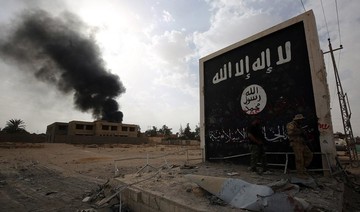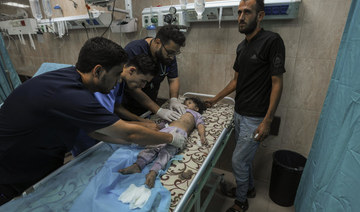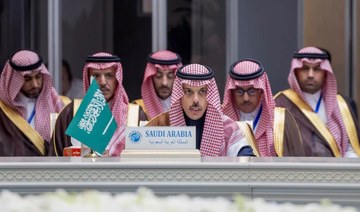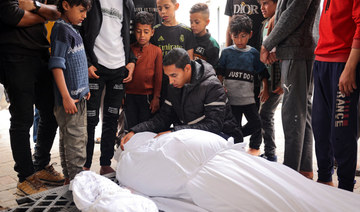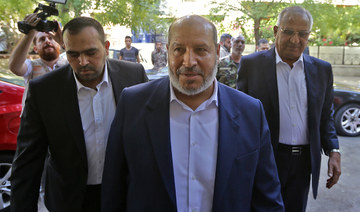BAGHDAD: A year after it was routed from Iraq in a devastating war that left entire neighborhoods and towns in ruins, the Daesh group is fighting to hang on to its last enclave in eastern Syria, engaging in deadly battles with US-backed forces.
Cornered in the desert near the Iraqi border with nowhere to run, the militants are putting up a fierce fight, inflicting hundreds of casualties among their opponents and releasing a stream of beheading videos reminiscent of the extremist group’s terrifying propaganda at the height of its power.
The battle for Hajjin has dragged on for three months, highlighting the difficulty of eradicating an extremist group determined to survive. In Iraq, there is rising concern that the group may stage a comeback. Daesh sleeper cells have recently launched deadly attacks against security forces and kidnapped and killed civilians, mostly in four northern and central provinces that were once part of the group’s self-declared caliphate.
“There is still major danger for Iraq and Syria especially in areas close to the border when it comes to Daesh,” a senior Iraqi intelligence official said, using an Arabic acronym to refer to the extremists. He spoke on condition of anonymity because he was not authorized to speak to media about security matters.
He said Daesh lost most of the income it once made from oil and taxes imposed in areas it controlled. The group now relies on selling gold and other reserves that they had accumulated after declaring their caliphate in June 2014. He said the money is being used to buy weapons and finance attacks in Iraq and Syria.
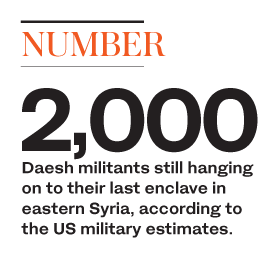 Another Iraqi intelligence official said Daesh has begun restructuring its command, relying more on non-Iraqi commanders after most of its leaders were killed in coalition strikes.
Another Iraqi intelligence official said Daesh has begun restructuring its command, relying more on non-Iraqi commanders after most of its leaders were killed in coalition strikes.
The Daesh group once held an area the size of Britain across vast territories straddling parts of Iraq and Syria, running a so-called caliphate and planning international attacks from its headquarters in the Syrian city of Raqqa. Tens of thousands were killed in both countries as an array of local forces, some backed by a US-led coalition, eventually drove the extremists out of virtually all the lands they once held.
Iraq’s then-Prime Minister Haider Al-Abadi declared final victory over the group on Dec. 9, 2017. Two months earlier, the coalition, working with Kurdish-dominated fighters known as the Syrian Democratic Forces, liberated Raqqa after a bombing campaign that decimated much of the city.
The area that Daesh still holds in Syria represents less than 1 percent of the territory it controlled at its height. The pocket is home to some 15,000 people, including Daesh fighters and their families. The US military estimates there are about 2,000 remaining Daesh fighters there.
The SDF launched their offensive to retake Hajjin on Sept. 10. It has been a grueling campaign, with sand storms and fog at times grounding coalition aircraft, allowing the militants to launch counteroffensives that have killed hundreds of SDF fighters. IS has also taken scores of prisoners and hundreds of civilians hostage.
“It is very difficult because we are in the last stages, where almost every Daesh fighter is a suicide belt,” Brett McGurk, the White House envoy for the war against IS, said at a security conference held recently in the Gulf nation of Bahrain.
The extremists, besieged near the border, have no place to go. They are surrounded from the east and north by SDF fighters while from the south and west, Syrian government forces and their allies have closed roads to the surrounding desert.
The Britain-based Syrian Observatory for Human Rights says since the fighting began nearly three months ago, 1,616 people have been killed, mostly fighters from both sides. It said the dead include 827 Daesh gunmen, 481 SDF fighters and 308 civilians.
The fighting is now believed to be in its final stages, with SDF fighters said to have broken IS defenses and taken the fight inside the town.
The fall of Hajjin will end the group’s hold over any significant territory in Iraq or Syria, but sleeper cells in both countries will continue to stage attacks amid attempts to regroup. Daesh affiliates in Libya, Afghanistan and Egypt’s Sinai Peninsula continue to stage regular attacks.
The group’s savage legacy, meanwhile, will stay for years to come.
Huge parts of Iraq and Syria are still in ruins, with little cash and — in Syria’s case — little international political will to rebuild.
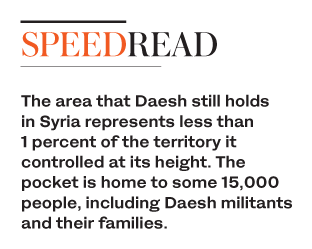 Emerging from the more than three years of war, Iraq estimates that $88.2 billion is needed to rebuild the country. An international donors’ summit held early this year in Kuwait gathered pledges of $30 billion that mainly came in the form of loans, but no progress has been made to fulfil the pledges.
Emerging from the more than three years of war, Iraq estimates that $88.2 billion is needed to rebuild the country. An international donors’ summit held early this year in Kuwait gathered pledges of $30 billion that mainly came in the form of loans, but no progress has been made to fulfil the pledges.
“The biggest problem we have is the lack of funds,” said Mustafa Al-Hiti, the head of a government-run reconstruction fund.
“What we spent till now is about 1.5 percent of what we need and that came as loans and donations,” Al-Hiti added.
Another challenge is the unexploded ordnance, mainly in the northern city of Mosul, where the climactic battle occurred. He estimated that 4 million unexploded bombs are still littered around Mosul, the largest city Daesh once held, with only 6 percent cleared so far.
Nuri Mehmud, an SDF spokesman speaking by telephone from Syria, said all of Daesh’s experienced fighters are now in the besieged area of Hajjin.
“It is a difficult battle but in the end we will wipe out Daesh,” he said.
Daesh fights to hang on a year after defeat in Iraq
Daesh fights to hang on a year after defeat in Iraq
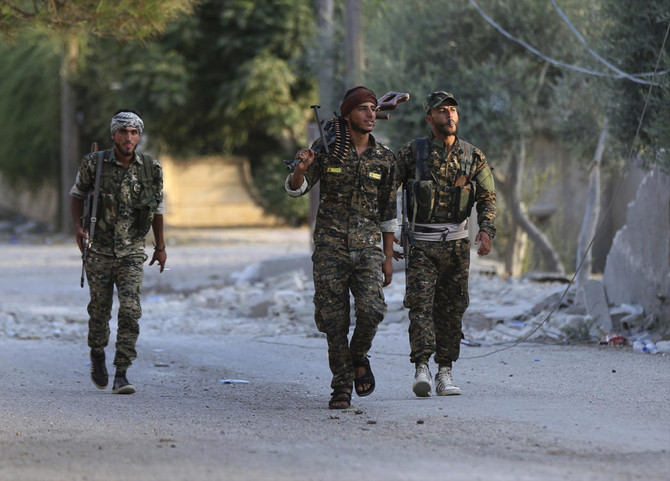
- “There is still major danger for Iraq and Syria especially in areas close to the border when it comes to Daesh,” a senior Iraqi intelligence official said
- Huge parts of Iraq and Syria are still in ruins, with little cash and — in Syria’s case — little international political will to rebuild
Jordanian PM, Palestinian president meet in Riyadh
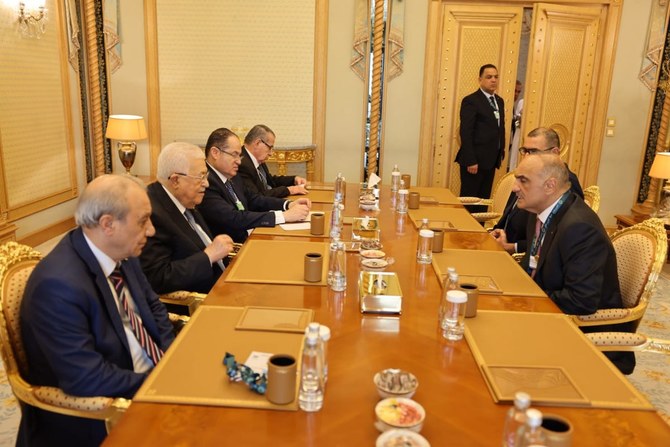
- Khasawneh underlined Jordan's efforts to halt the war in Gaza and ensure sustained humanitarian aid flow
RIYADH: Jordan’s Prime Minister Bisher Khasawneh met with Palestinian President Mahmoud Abbas during a special session of the World Economic Forum in Riyadh on Monday, Jordan News Agency reported.
Khasawneh reaffirmed Jordan’s support for the Palestinian cause and its commitment to providing assistance to Palestinians in their pursuit of legitimate rights on their national soil.
He said that lasting peace and stability in the region depend on a political resolution within the framework of a two-state solution.
Khasawneh said that such a solution should lead to the establishment of an independent, fully sovereign Palestinian state, with East Jerusalem as its capital, based on the lines of June 4, 1967.
He underlined Jordan's efforts to halt the war in Gaza and ensure sustained humanitarian aid flow.
Jordan remains committed to delivering aid to Gaza through both land crossings and airdrops conducted by the Jordanian army, Khasawneh said.
In a CNN interview earlier this month, Jordan’s Queen Rania explained the reason for the airdrops in an area where the UN has reported a widespread food crisis.
“We found that after trying so hard in vain to persuade Israel to open the land access points, that we had to do something. We couldn’t just sit idle and watch people starving,” she said.
Khasawneh also warned against any Israeli military assault on the Palestinian city of Rafah.
Both parties agreed to convene meetings of the Jordanian-Palestinian Joint Higher Committee in Amman in early June, led by the respective prime ministers.
GCC countries can play pivotal role in Africa’s economic development, African stakeholders say
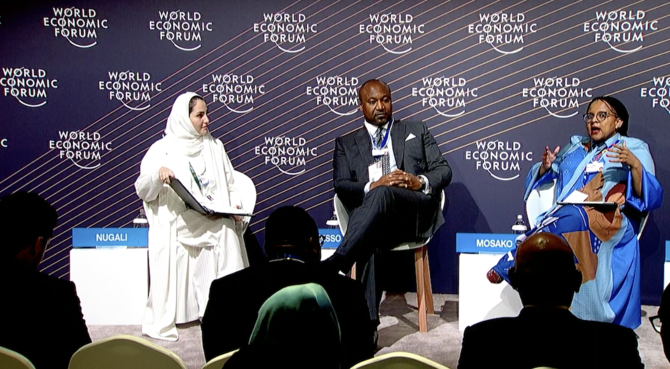
- Economic relations between Africa and the GCC are set to grow significantly in the coming years
RIYADH: Member nations of the Gulf Cooperation Council can play a pivotal role in developing African economies, a special meeting of the World Economic Forum in Riyadh was told on Sunday.
Economic relations between Africa and the GCC are set to grow significantly in the coming years, economists have said, driven by mutual interests in economic diversification, investment and sustainable development.
Denis Christel Sassou Nguesso, the Republic of Congo’s international cooperation minister, said countries in central and western Africa had traditionally looked to Western powers, such as the US, France and the UK, for assistance with their development but were increasingly looking to forge links with GCC countries.
“It’s a good opportunity and position to start to work on this cooperation with (countries such as) Saudi Arabia, UAE, Qatar, Oman and Bahrain. They can help (African) countries to develop their economies and infrastructure projects,” he said.
“We’re not looking for an equal economy (with GCC states), but we’d like to build some bridges toward partnerships between our countries, to promote the public-private partnership.”
Boitumelo Mosako, CEO at the Development Bank of Southern Africa, told the panel that the GCC and African Union were founded on the same date, which coincides with Africa Day.
The GCC and the Organization of African Unity, which was replaced by the African Union, were both founded on May 25.
This was a symbol of the strong partnerships that had evolved between Africa and GCC countries, especially in direct trade, Mosako said.
“When it comes to infrastructure, that is where I see the greatest opportunity. As we all know, (Africa) is a continent with an infrastructure backlog, but we are one with aspirations of implementing an African free-trade agreement.”
But in order for this to be achieved, infrastructure projects had to be built quickly, which would not only benefit African economies but also global partners as Africa’s exports to those countries would be able to increase exponentially, Mosako said.
Highlighting opportunities in energy investment from GCC countries, she added: “We have seen this in South Africa, where GCC companies have partnered local entities as part of a renewable energy program, so it’s not something far-fetched, it’s actually happening. It’s an opportunity to close the energy gap for the continent.”
Ousmane Dione, vice president for the Middle East and North Africa at the World Bank, said that at its shortest distance, there were only 26 km between Africa and the GCC, but there was a much bigger metaphorical gap in investment from the GCC states into Africa, which he called a “land of opportunity.”
He said that by 2035, there would be 430 million young Africans coming into the labor market competing for just 100 million jobs if current policies remained in place.
This could either be a “demographic liability or a demographic dividend” depending on how other countries viewed it, he said.
“I see the GCC countries really being a part of what will be the future of that relationship, in terms of a partnership.”
Houthis expecting ‘hostile’ reaction from US over Red Sea attacks, drone downing
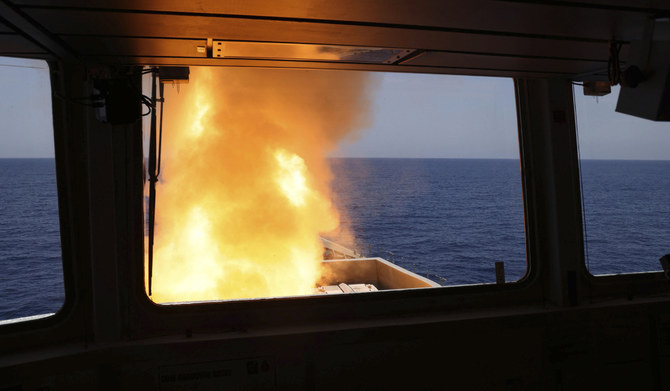
- US Defense Department says MQ-9 Reaper crashed in Yemen
- British-owned oil tanker damaged after being hit by missiles
AL-MUKALLA: The Houthis claim the US is planning a new round of strikes on Yemen in response to its attacks on ships in the Red Sea and the downing of an American drone.
In a post on X on Saturday afternoon, Hussein Al-Ezzi, the militia’s deputy foreign minister, said: “Now America and its mercenaries are considering new hostile plans, and we tell them the same thing: you will fail.”
In a separate message, posted on X on Saturday morning, Al-Ezzi said the Houthis were aware that the US was plotting a fresh military campaign against them and pledged to strike back against US interests wherever they may be.
That warning came after military spokesperson Yahya Sarea said the militia launched missiles at the British-owned and Panamanian-flagged Andromeda Star oil tanker in the Red Sea and shot down a US MQ-9 Reaper drone above its stronghold in the northern province of Saada.
US Defense Department spokesperson Lt. Col. Bryon J. McGarry told The Associated Press on Saturday that an MQ-9 drone had crashed in Yemen and that an inquiry was underway.
The US Central Command said on Saturday morning that the Andromeda Star received minor damage after being hit by missiles launched by the Houthis on Friday afternoon.
Shipping website Marinetraffic.com said the tanker was traveling from the Port of Sudan to an unnamed destination.
Houthi missiles on Friday also fell near the MV MAISHA, an oil tanker controlled by Liberia and traveling under the flag of Antigua and Barbuda, the Central Command said.
Since November, the Houthis have seized one commercial ship, sunk another and launched hundreds of missiles and drones at commercial and navy vessels in the Red Sea, Bab Al-Mandab Strait and the Gulf of Aden.
The group claims it targets vessels bound for or with links to Israel in a bid to force it to break its blockade on the Gaza Strip.
On Wednesday, the Houthis ended a nearly two-week break in their attacks by claiming credit for hitting a US-owned ship, a US Navy destroyer and an Israeli vessel in the Gulf of Aden and Indian Ocean.
Meanwhile, the Yemeni government and the Houthis swapped accusations on Saturday after a drone laden with explosives killed five women in the Maqbanah district of Taiz province.
The government said the Houthis launched the drone at women gathering water from a well and also fired artillery rounds and heavy machine guns into civilian areas and military sites southeast of Taiz.
The Houthi Ministry of Health said three women and two children were killed after a drone launched by Yemeni government soldiers cut through a crowd of villagers getting water from a well in Al-Shajeen village in Maqbanah.
Hamas official says delegation to respond to Gaza truce plan in Egypt Monday
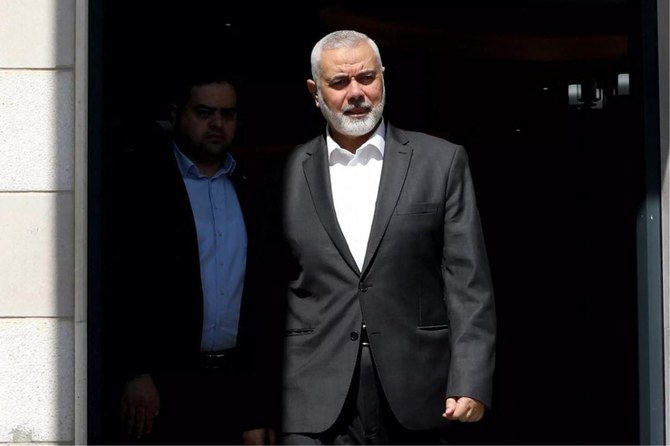
- There is growing international pressure for Hamas and Israel to reach a ceasefire deal and avert an Israeli attack on Rafah
- Hamas delegation to visit Cairo on Monday for ceasefire talks
TEL AVIV: A senior Hamas official on Sunday said that the group would deliver its response to Israel’s latest counterproposal for a Gaza ceasefire on Monday in Egypt.
“A Hamas delegation headed by Khalil Al-Hayya will arrive in Egypt tomorrow... and deliver the movement’s response” to the Israeli proposal during a meeting with Egyptian intelligence officials, said the official who declined to be named told AFP.
Mediator Egypt had sent its own delegation to Israel this week to jump-start stalled negotiations even as fighting in the Gaza Strip rages.
Egypt, Qatar and the United States have been unsuccessfully trying to broker a new Gaza truce deal ever since a one-week halt to the fighting in November saw 80 Israeli hostages exchanged for 240 Palestinians held in Israeli prisons.
Earlier, a senior Qatari official has urged both Israel and Hamas to show “more commitment and more seriousness” in ceasefire negotiations in interviews with Israeli media, as pressure builds on both sides to move toward a deal that would set Israeli hostages free and bring potential respite in the nearly 7-month-long war in Gaza.
The interviews with the liberal daily Haaretz and the Israeli public broadcaster Kan were published and aired Saturday evening. They came as Israel still promises to invade Gaza’s southernmost city of Rafah despite global concern for hundreds of thousands of Palestinians sheltering there and as the sides are exchanging proposals surrounding a ceasefire deal.
Qatar, which hosts Hamas headquarters in Doha, has been a key intermediary throughout the Israel-Hamas war. Along with the US and Egypt, Qatar was instrumental in helping negotiate a brief halt to the fighting in November that led to the release of dozens of hostages.
The sides have held numerous rounds of negotiations since, none of which produced an additional truce. In a sign of its frustration, Qatar last week said it was reassessing its role as mediator.
In the interviews, Qatar’s Foreign Ministry spokesperson Majed Al-Ansari expressed disappointment in both Hamas and Israel, saying each side has made its decisions based on political interests and not with the good of civilians in mind.
“We were hoping to see more commitment and more seriousness on both sides,” he told Haaretz.
He did not reveal details of the current state of the talks, other than to say they have “effectively stopped,” with “both sides entrenched in their positions.”
“If there is a renewed sense of commitment on both sides, I’m sure we can reach a deal,” he said.
The Israeli journalists conducted the interviews in Qatar, which has no formal diplomatic ties with Israel.
Relations between Qatar and Israel have been strained throughout the war, as some politicians in Israel, including Prime Minister Benjamin Netanyahu, have criticized Qatar for not putting enough pressure on Hamas.
Israeli legislators have also cleared the way for the country to expel Al Jazeera, the Qatar-owned broadcaster.
Al-Ansari’s remarks came after an Egyptian delegation had discussed with Israeli officials a “new vision” for a prolonged ceasefire in Gaza, according to an Egyptian official, who spoke on condition of anonymity to freely discuss the developments.
Hamas meanwhile said Saturday it was reviewing a new Israeli proposal for a ceasefire, which came in response to a Hamas proposal from two weeks ago.
Negotiations earlier this month centered on a six-week ceasefire proposal and the release of 40 civilian and sick hostages held by Hamas in exchange for freeing hundreds of Palestinian prisoners in Israeli jails.
There is growing international pressure for Hamas and Israel to reach a ceasefire deal and avert an Israeli attack on Rafah.
A letter penned by US President Joe Biden along with 17 other world leaders urged Hamas to release the hostages immediately.
Hamas in recent days has released new videos of three hostages it holds, which appear to be meant to push Israel to make concessions.
Israel meanwhile has massed dozens of tanks and armored vehicles ahead of an expected offensive in Rafah, where more than half of Gaza’s 2.3 million population is seeking shelter. The planned incursion has raised global alarm because of concerns over potential harm to civilians. The troop buildup may also be a pressure tactic on Hamas in the truce talks.
Israel sees Rafah as Hamas’ last major stronghold and has vowed to attack the militant group there in its bid to destroy its military and governing capabilities.
The war was sparked with Hamas’ attack on Oct. 7 into southern Israel, which killed 1,200 people, mostly civilians, according to Israeli authorities, who say another 250 people were taken hostage. Hamas and other groups are holding about 130 people, including the remains of about 30, Israeli authorities say.
Israel’s retaliatory assault on Hamas has killed more than 34,000 people, most of them women and children, according to health authorities in Gaza, who do not distinguish between civilians and combatants in their tally. The Israeli military says it has killed at least 12,000 militants, without providing evidence to back the claim.
France to make proposals in Lebanon to prevent war between Hezbollah and Israel
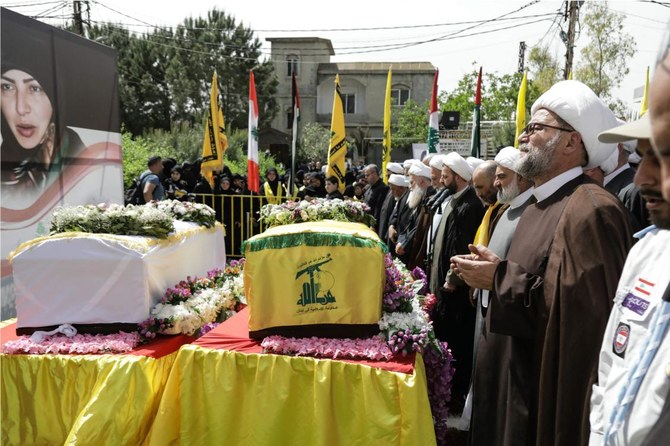
NAQOURA: France’s foreign minister said that he would make proposals to Lebanese officials on Sunday aimed at easing tensions between Hezbollah and Israel and preventing a war breaking out.
“If I look at the situation today if there was not a war in Gaza, we could be talking about a war in southern Lebanon given the number of strikes and the impact on the area,” Stephane Sejourne said after visiting the United Nations peace keeping force in Naqoura, southern Lebanon.
“I will pass messages and make proposals to the authorities here to stabilize this zone and avoid a war.”


